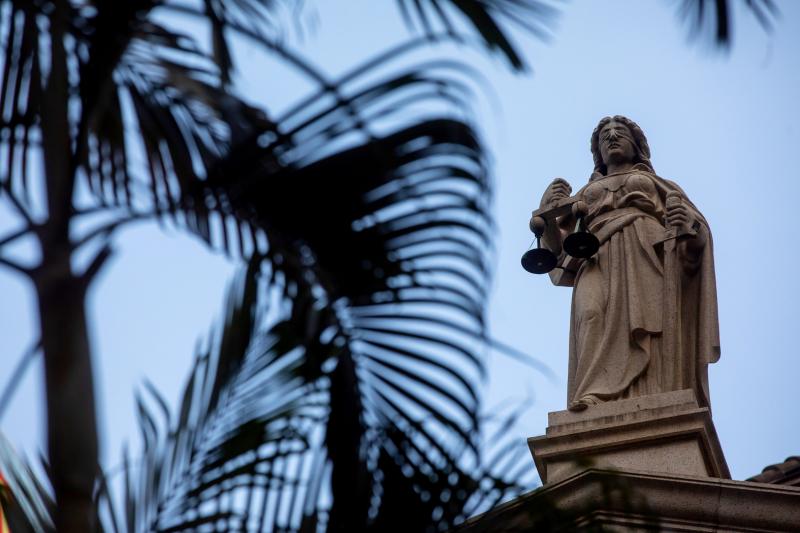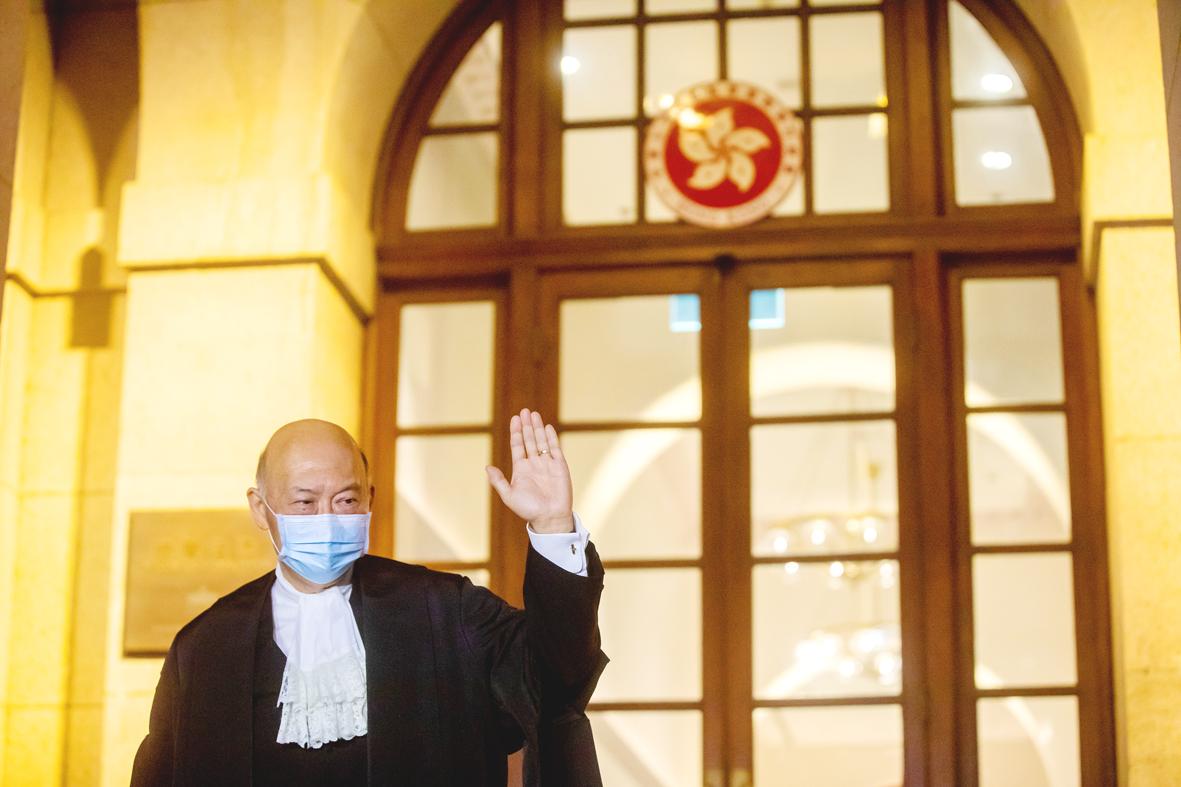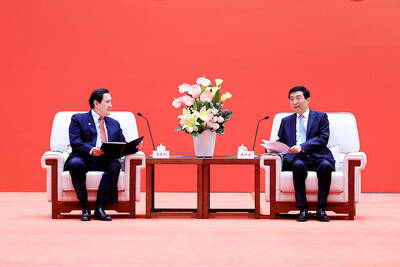Wednesday’s sweeping arrests of more than 50 pro-democracy activists, pollsters, politicians and fundraisers in Hong Kong seemed to all but criminalize opposition politics in the city.
Those arrested face charges of subversion for their role in unofficial primary elections held last summer that aimed to maximize the pro-democracy bloc’s performance in elections to the city’s legislative council.
“The plan of any opposition party is to win an election, [or] to be in a position for the government to negotiate with you; that is the virtue of democracy. So why it should be seen as a plot, as subversive? That’s beyond my comprehension, but that is the reality in Hong Kong,” said Prof Jean-Pierre Cabestan, professor at Hong Kong Baptist University. “Clearly we are moving towards a semi-authoritarian environment.”

Photo: Bloomberg
The long-shot goal of the loosely allied group who have been detained was to claim half the seats on the legislative body — despite an electoral process stacked against them by design — and to use that to block the government’s agenda and force the resignation of the city’s chief executive, Carrie Lam (林鄭月娥).
They were not planning to use violence, or break the law; the project took advantage of provisions laid out under the Basic Law, the city’s constitution.
The mass arrests showcased the Hong Kong authorities’ severely diminished tolerance for peaceful, political opposition in a city that just a year ago still enjoyed a limited form of autonomy.

Photo: Bloomberg
Last summer it was transformed by Beijing’s passage of a sweeping national security law, ostensibly to crackdown on protests that roiled the city for over a year but used to attack critics in politics and beyond including in the media, academia and education.
“What is normal in the rest of the world, and was normal in Hong Kong until a few months ago, is not normal in Hong Kong now,” said Victoria Hui (許田波), associate professor of political science at the University of Notre Dame, and specialist in Hong Kong politics.
“When the law was announced, [authorities] said it would only be used to target a small minority but it is obvious now it was meant to completely silence any dissent.”
Political parties have not been banned and other candidates can contest the elections, but Wednesday’s detentions raise the question of what, if anything, opposition lawmakers are actually allowed to do.
The arrests follow a months-long campaign against the city’s pro-democratic politicians, with some candidates initially barred from standing in the legislative elections, then serving pro-democratic lawmakers were disqualified.
The scale of Wednesday’s operation, with more than 1,000 officers deployed to round up some of Hong Kong’s most prominent pro-democracy figures, have shocked a movement accustomed to bleak news and with several leading figures — including the activist Joshua Wong (黃之鋒) and tycoon Jimmy Lai (黎智英) – already in jail.
Those who have been detained are unlikely to be able to contest the next elections, which were delayed for a year on the grounds of the pandemic and have now been rescheduled for the autumn; other candidates are likely to have less experience and recognition.
Trials would suck up huge amounts of funds and political energy that would otherwise have been poured into contesting the vote, Hui said.
But few expect it will mark the nadir for the city’s pro-democracy movement. One fear is that a provision of a law which allows suspects to be taken to the mainland for trial could be used against some of the group.
Hong Kong still has an independent judiciary, although authorities are allowed to handpick judges presiding over national security trials. China in contrast has an opaque and heavily politicized criminal justice system, dogged by persistent and credible accusations of mistreatment and torture.
Beijing’s critics are braced for security forces to make further moves against sectors including the media and academia which the authorities have already targeted.
And Wednesday’s detainees included the first American citizen held under the national security law, longtime resident John Clancey, a clear message to the city’s large expatriate community that foreign passports will not offer any protection if they become involved in pro-democracy politics or activism.
“Hong Kong has been experiencing this constant escalation for the last few months,” Hui said. “It means we just have to expect the worse is yet to come.”
There has been outrage from around the world, with condemnation from prominent politicians including the US president-elect, Joe Biden’s nominee for secretary of state, and the last British governor of Hong Kong, Chris Patten.
But with sanctions already imposed on the city’s leadership, there are questions about what more can be done. Ad hoc measures may not be the best response.
Instead the west might need to rethink how it dealt with Hong Kong, recognizing that the city has fundamentally changed, said Steve Tsang (曾銳生), director of the SOAS China Institute in London
“I think what we need to do is first of all recognize we are dealing with a paradigm change,” he said. The “special administrative region” (SAR) brought into existence, with all its rights and privileges, at the 1997 handover from British colonial rule, had effectively ended.
“We are talking about something very very different. If we are stuck in the mindset of SAR 1.0 and [China] are on SAR 2.0 we will never be effective in response to changes in Hong Kong.”

The canonical shot of an East Asian city is a night skyline studded with towering apartment and office buildings, bright with neon and plastic signage, a landscape of energy and modernity. Another classic image is the same city seen from above, in which identical apartment towers march across the city, spilling out over nearby geography, like stylized soldiers colonizing new territory in a board game. Densely populated dynamic conurbations of money, technological innovation and convenience, it is hard to see the cities of East Asia as what they truly are: necropolises. Why is this? The East Asian development model, with

Desperate dads meet in car parks to exchange packets; exhausted parents slip it into their kids’ drinks; families wait months for prescriptions buy it “off label.” But is it worth the risk? “The first time I gave him a gummy, I thought, ‘Oh my God, have I killed him?’ He just passed out in front of the TV. That never happens.” Jen remembers giving her son, David, six, melatonin to help him sleep. She got them from a friend, a pediatrician who gave them to her own child. “It was sort of hilarious. She had half a tub of gummies,

The wide-screen spectacle of Formula One gets a gleaming, rip-roaring workout in Joseph Kosinski’s F1, a fine-tuned machine of a movie that, in its most riveting racing scenes, approaches a kind of high-speed splendor. Kosinski, who last endeavored to put moviegoers in the seat of a fighter jet in Top Gun: Maverick, has moved to the open cockpits of Formula One with much the same affection, if not outright need, for speed. A lot of the same team is back. Jerry Bruckheimer produces. Ehren Kruger, a co-writer on Maverick, takes sole credit here. Hans Zimmer, a co-composer previously, supplies the thumping

There is an old British curse, “may you live in interesting times,” passed off as ancient Chinese wisdom to make it sound more exotic and profound. We are living in interesting times. From US President Donald Trump’s decision on American tariffs, to how the recalls will play out, to uncertainty about how events are evolving in China, we can do nothing more than wait with bated breath. At the cusp of potentially momentous change, it is a good time to take stock of the current state of Taiwan’s political parties. As things stand, all three major parties are struggling. For our examination of the